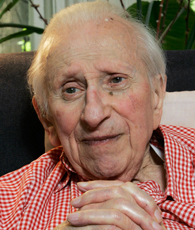For 45 years, Studs Terkel conducted interviews with people from all walks of life. Through his radio program and published oral histories, Terkel was able to capture the pulse of American life from such varied people as celebrities, politicians, war veterans and single mothers.
Studs Terkel’s Early Days
Louis Terkel was born on May 16, 1912, in the Bronx, New York, to a tailor and a seamstress. When he was 10 years old, his family moved to Chicago and operated a boarding house. Terkel says he owes his worldly mind “to the tenants who gathered in the lobby of the hotel” and at the nearby Bughouse Square, “a meeting place for workers, labor organizers, dissidents, the unemployed, and religious fanatics of many persuasions,” according to a biography in “Studs Terkel: Conversations with America,” an online archive hosted by the Chicago History Museum.
Terkel received a law degree from the University of Chicago in 1934. He decided not to practice law, and took a position with the radio division of Chicago’s WPA Writers Project, appearing on radio soap operas and a news program. In his early 20s, Terkel assumed the name Studs, after the character Studs Lonigan from James T. Farrell’s crime novels, according to a 2007 profile of Terkel in The Independent.
Sources in this Story
- Chicago History Museum: Studs Terkel: Conversations with America: Biography
- The Independent: Studs Terkel: The world’s greatest interviewer
- Rich Samuels: Broadcasting in Chicago, 1921-1989: Studs’s Place
- Chicago History Museum: Studs Terkel: Conversations with America: Galleries
- Chicago History Museum: Studs Terkel: Conversations with America: Chicago History Museum
- The New York Times: Sunday Book Review: Studs’s Place
- Guardian: Obituary: Studs Terkel
Notable Accomplishments
In 1949, Terkel began starring in his own TV show. “Studs’s Place” was an improvised comedy set in a diner, with Studs playing the owner.
Terkel’s socialist views made him a target of Senator Joseph McCarthy’s anti-Communist crusade, and he was blacklisted from television. In the early 1950s, Chicago radio station WFMT offered Terkel the opportunity to host his own show. For the next 45 years, “The Studs Terkel Program” served as a respected interviewing arena for people from all walks of life.
Terkel published his first book, “Giants of Jazz,” in 1956. His second book, “Division Street: America” (1966), was a collection of oral histories. Terkel followed this collection with other oral histories that focused on key social issues and events. In 1985, he won a Pulitzer Prize for his book “The Good War: An Oral History of World War II” (1984).
The Man and His Work
- “Hard Times: An Oral History of the Great Depression” (1970)
- “Working: People Talk About What They Do All Day and How They Feel About What They Do” (1974)
- “Race: How Blacks and Whites Think and Feel About the American Obsession” (1992)
The Rest of the Story
In 1998, Terkel took a position as the very first Distinguished Scholar-in-Residence for the Chicago Historical Society. That same year he donated more than 6,000 reels and about 5,000 hours of recordings from “The Studs Terkel Program” to the Society.
In 2007, Terkel published “Touch and Go: A Memoir.” In a New York Times Book Review, Dan Barry called the book “an engrossing stream-of-consciousness meditation on the 20th century by a man who, it seems, never forgave himself for being born three weeks after the sinking of the Titanic, and so he vowed in the crib to bear witness—to everything.”
The “master chronicler of American life in the 20th century,” as the Guardian called Terkel, died on October 31, 2008, at the age of 96. In a loving obituary, Ed Vulliamy calls Terkel “the world’s greatest—and loudest-mouthed—listener.”











